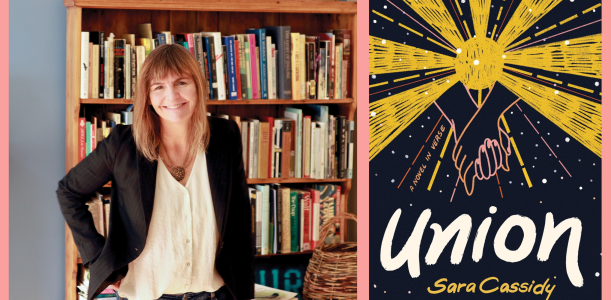“This brief verse novel packs a punch: The poems are concise yet robust and convey a change in tone from sobering and intense to hopeful…Moving and accessible.”
—Kirkus Reviews
Tuck navigates new love, past trauma and standing up for what’s right in this novel in verse.
Grace has caught my eye
I stare and stare
at this girl I’ve missed
since we were five
Abuse at the hands of his mother’s boyfriend has left fifteen-year-old Tuck broken and untrusting. But then he falls hard for his childhood friend Grace and starts to imagine a life where he is happy. At the fast-food restaurant where he works, Tuck is asked to explore starting up a union. His new sense of purpose, combined with his growing love for Grace, helps Tuck come to terms with his pain and find the strength to begin the healing process.
In this Q&A, award-winning author Sara Cassidy shares the inspiration, key messages and more for her new book for teen readers, Union. Available now.
*This Q&A includes a brief reference to abuse and sexual assault.*
1. Describe Union in 3 words.
Love unites us.
2. What inspired you to write this story?
Teens. Their creativity, their love of language, their willingness to take risks, their power to buck the system, their determination to become and re-become whole. Also my own long journey to heal from years-long abuse that began when I was 17.
3. Why did you decide to write Union in verse and with almost all single-syllable words?
The novel is in the voice of 15-year-old Tuck, who is suffering alone, disconnected even from himself. His spirit has been crushed, and he can barely speak. He can only utter. At the same time, he is a teenager—intelligent and sensitive, with burgeoning independence—and he has fallen in love. Despite his suffering, life is full of new ideas, new people, new power and the widening of possibility. Poetry is honest, non-linear and constantly inventive, so it was the best language to convey the surprises, depths and contradictions of this time in Tuck’s life.
4. Does writing a book in verse change your process?
There is less explaining, less laying out of the scene. It very much comes from within the character’s experience. Verse calls for rhythm and music—writing in single syllables sometimes posed a challenge to finding that musicality. At the same time, the single-syllable restriction forced me to use words I would not normally have thought to use, which influenced what the story became.
5. What do you hope readers take away from the book?
That we can change the course of things that are greater than us, as Tuck does with his union work, but we also have to protect and replenish who we are. It’s a difficult balance, but our friends can help us keep it, as we should help them. I hope that readers who are suffering will reach out for help, as Tuck does. And I hope that readers better understand that the people in our classes, at work, in the street, have their own complex stories.
6. The main character Tuck works at a fast-food chain under some crummy conditions until they unionize. What was your first job like? Have you ever been part of a union?
I’ve experienced all the crummy conditions Tuck experiences. I worked at fast-food restaurants and bars where managers took my tips and/or sexually harassed me. I quit a clothing factory job when I started waking up with drycleaner fluid thick in my throat and nose. I worked in a treeplanting camp where the planters paid exorbitant camp costs for meals of white bread and jam. Another treeplanting company sent us onto land recently sprayed with pesticides; planters fainted and vomited. Consequently, I joined a number of worker collectives (two bookstores, a treeplanting co-op and a cafe), where decisions were made by consensus, safety mattered and diversity policies were in place. More recently, I supported a union drive at the B.C. Legislature. Workers need collective rights. We can’t simply trust employers to do the right thing.
But you’ve also asked about my own first job. I worked in a Russian Jewish delicatessen in Winnipeg where artists filled up on delicious, well-priced borscht, and cabbies played long games of chess. The pay was fair, and the boss was respectful, supportive and even loving. Thank you, Misha!
Sara Cassidy is a writer and editor. Her children’s books have been shortlisted for many awards, including the Governor General’s Literary Award, the Bolen Books Children’s Book Prize, the Silver Birch Express Award, the Ruth and Sylvia Schwartz Children’s Book Award, the Rocky Mountain Book Award and the Chocolate Lily Award. Most recently, she won the Sheila A. Egoff Children’s Literature Prize for her chapter book Genius Jolene. Sara also writes nonfiction and poetry for adults. She lives in Victoria, British Columbia.



